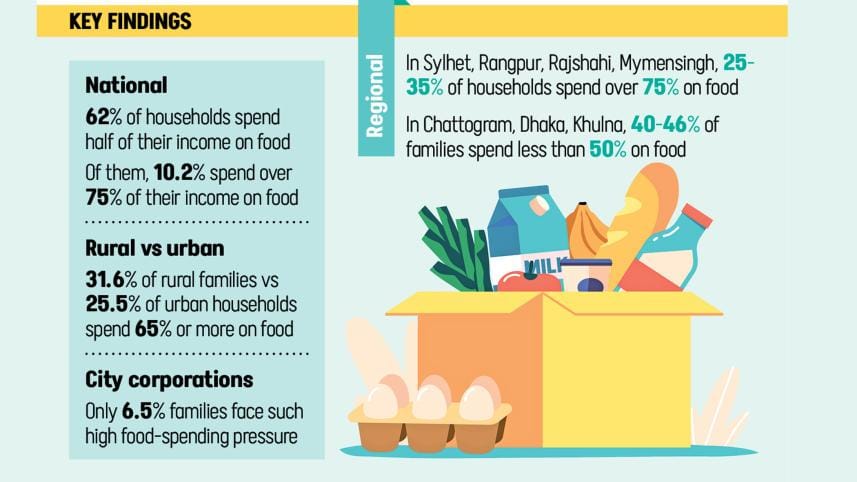62% of households spend half of their income on food: BBS

More than 60 percent of households in Bangladesh spend at least half of their total income on food, according to a new study by the Bangladesh Bureau of Statistics (BBS).
Of them, around one in ten families allocate more than three-quarters of their budget just to put meals on the table, highlighting the high vulnerability, according to the report.
The findings on food security and coping mechanisms were unveiled at an internal BBS meeting on Thursday.
The data of the study were collected in June 2023 and published in December of the same year. BBS conducted the latest analysis with support from the United Nations World Food Programme (WFP).

Analysts say the data is still relevant as the food security outlook did not improve significantly compared to the period just after the pandemic.
Aleya Akter, secretary of the statistics and informatics division, attended the meeting as the chief guest, while BBS Director General Mohammed Mizanur Rahman chaired the session. The study showed a sharp rural-urban divide for food spending.
In rural areas, 31.6 percent of households spend 65 percent or more of their income on food, compared with 25.5 percent in urban areas.
In city corporations, only 6.5 percent of households face such high food expenditure, reflecting better income opportunities and greater purchasing power.
Regional differences are equally striking. In Chattogram, Dhaka, and Khulna divisions, 40-46 percent of households spend less than half of their income on food.
By contrast, in Sylhet, Rangpur, Rajshahi, and Mymensingh, 25-35 percent of households allocate more than 75 percent of their budget to food, underlining widespread vulnerability in these regions.
"It cannot be claimed that the current situation has improved a lot compared to the Covid period," said Selim Raihan, an economics professor at Dhaka University and also the executive director at South Asian Network on Economic Modeling (Sanem).
The report also highlights nutritional concerns.
Only 15 percent of families regularly consumed iron-rich foods, while 9 percent had not consumed any iron-rich foods in the week before the study.
Barisal showed the highest rate of zero iron-rich food consumption, as 19 percent of families in the region did not consume any iron-rich foods in the week before the study.
Protein intake also varies by region. In Rajshahi, 26 percent of households reported consuming protein-rich foods.
Raihan said, "Instead of improving, some risk factors, such as persistent higher inflation and eroding purchasing power, have been added. This has resulted in low protein and nutritional intakes."
Across the country, nearly three in ten households fall into the poor to borderline category of the Food Consumption Score (FCS), a key indicator of dietary diversity and nutritional security.
Urban areas show particular stress, with 28 percent of households recording poor to borderline FCS.
By contrast, city corporations fare better, with only 15 percent of households classified as vulnerable.
The most concerning situation is in Rajshahi division, where almost half of all households have poor to borderline FCS, making it the worst-affected region nationally.
"The findings are not surprising," said Prof Selim Raihan, referring to recent reports by think tanks that painted depressing pictures of food security and overall poverty.
"We have been talking about these for years," he added.
BBS DG Mizanur Rahman said, "This was a study report, like an analysis, not a survey. In association with WFP, BBS has conducted the study based on the data of Food Statistics 2023."
"We have done the study to assess the country's food security situation in Bangladesh and evaluate the prevalence and severity of food insecurity at the national and divisional levels," added Mehena Tabassum, focal point officer of the study.



 For all latest news, follow The Daily Star's Google News channel.
For all latest news, follow The Daily Star's Google News channel.
Comments